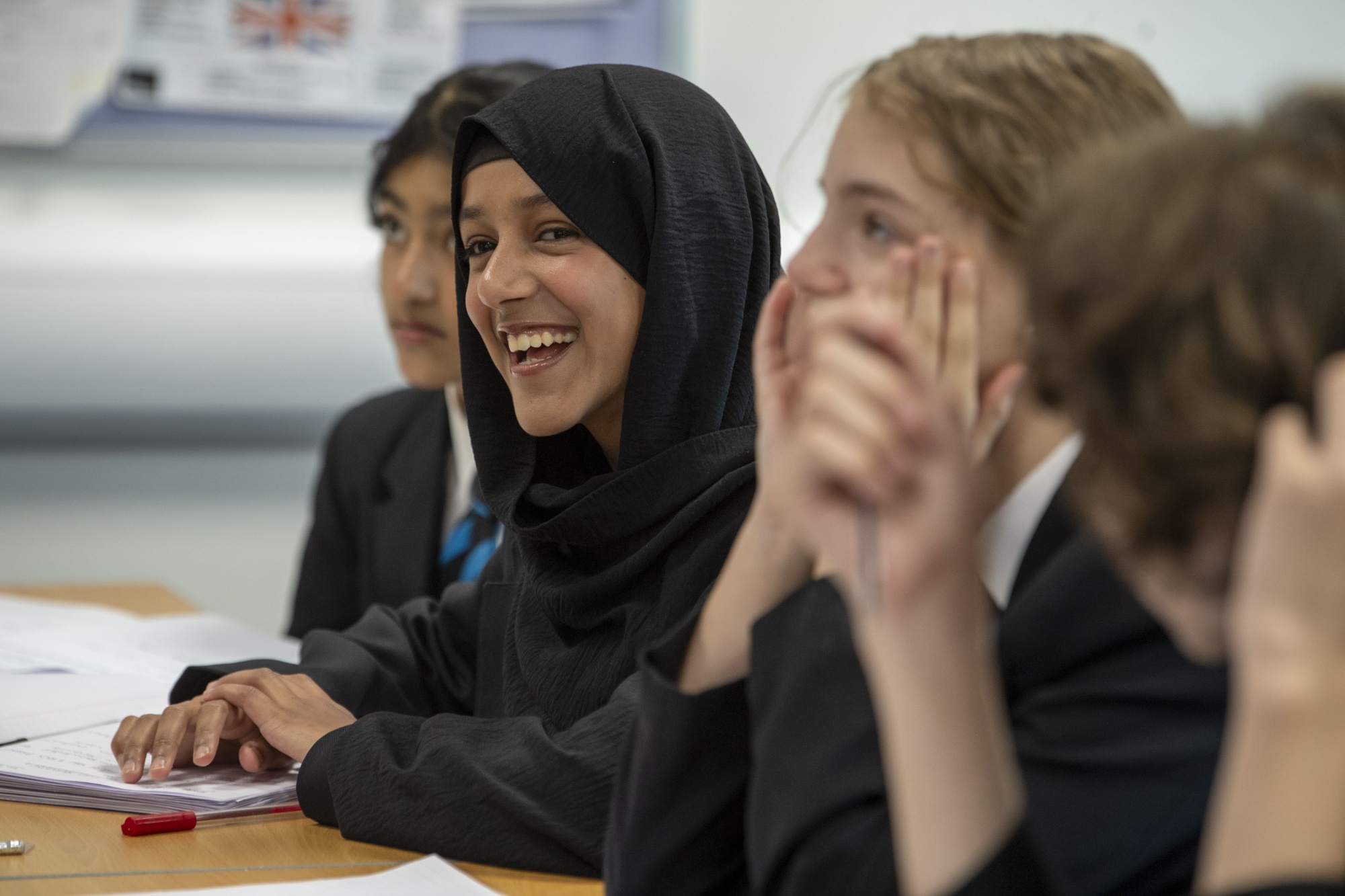French

Year 7
In Year 7, students develop a strong foundation in French by exploring topics such as personal identity (name, age, birthday, where they live), physical and personality descriptions, family and pets, and school life—including subjects, opinions, teachers, routines, and uniform. The curriculum also encourages reflection on the value of learning languages and how language skills relate to future careers.
Grammar focuses on the present tense (first and third person), with key verbs like avoir, etre, aimer, and faire. Students are introduced to infinitives used after opinion phrases and modal verbs, and learn noun-adjective agreement alongside sentence-building tools like connectives, intensifiers, and time markers. Vocabulary is carefully sequenced and regularly revisited to support fluency and retention.
Phonics teaching is explicit and ongoing, helping students master French pronunciation patterns such as vowels and silent letters. This strengthens their reading and speaking skills.
By the end of the year, students will be able to write structured paragraphs in the present tense describing themselves and others, give opinions, and discuss familiar topics. Speaking activities focus on short conversations to build confidence and accuracy, supported by pair work and retrieval practice. Reading aloud is practiced to improve pronunciation, while listening and reading comprehension tasks develop skills in understanding short texts using context clues and key vocabulary.
Year 8
Year 8 French at Colne Primet Academy aims to build on the knowledge and skills pupils started to acquire in year 7 in order to prepare for future success at GCSE. Through their study of various themes and topics based on familiar contexts, they will develop their grammatical and linguistic abilities.
They will be taught skills they need to acquire to make progress, including pronunciation practice. Lessons will include a variety of listening, reading, speaking and writing tasks and there will be a focus on enabling pupils to develop independent strategies for learning. There will be clear grammar progression and resources to help with active learning of grammar. In year 8 they will start to use different tenses in French.
They will study topics such as:
- Holidays
- Hobbies and sports
- French speaking countries
- Describing their local area and saying where they live.
Vocabulary is carefully sequenced and regularly revisited to support fluency and retention.
Phonics teaching is explicit and ongoing, helping students master French pronunciation patterns such as vowels and silent letters. This strengthens their reading and speaking skills.
Year 9
Year 9 French at Colne Primet Academy aims to build on the knowledge and skills pupils started to acquire in years 7 and 8 in order to prepare for future success at GCSE. Through their study of various themes and topics based on familiar contexts, they will develop their grammatical and linguistic abilities. Lessons will include a variety of listening, reading, speaking and writing tasks and there will be a focus on enabling pupils to develop independent strategies for learning. There will be clear grammar progression and resources to help with active learning of grammar. In year 9 they will continue to use different tenses in French.
They will study topics such as:
- Hobbies, friends and celebrations
- Jobs and future plans
- Music
- Different countries and travel
Vocabulary is carefully sequenced and regularly revisited to support fluency and retention. Phonics teaching is explicit and ongoing, helping students master French pronunciation patterns such as vowels and silent letters. This strengthens their reading and speaking skills. Most phonics patterns are now embedded and revisited regularly.
Year 10
GCSE French has a Foundation Tier (grades 1–5) and a Higher Tier (grades 4–9). Students must take all four question papers at the same tier. All question papers must be taken in the same series.
Paper 1: Listening
What's assessed?
Understanding and responding to different types of spoken language
How it's assessed? • Written exam: 35 minutes (Foundation Tier), 45 minutes (Higher Tier) • 40 marks (Foundation Tier), 50 marks (Higher Tier) • 25% of GCSE (Each exam includes 5 minutes’ reading time of the question paper before the listening stimulus is played.)
Paper 2: Speaking
What's assessed?
Communicating and interacting effectively in speech for a variety of purposes
How it's assessed? • Non-exam assessment • 7–9 minutes (Foundation Tier) + preparation time • 10–12 minutes (Higher Tier) + preparation time • 60 marks (for each of Foundation Tier and Higher Tier) • 25% of GCSE Questions Foundation Tier and Higher Tier. The format is the same at Foundation Tier and Higher Tier, but with different stimulus questions for the Photo card and different stimulus materials for the Role-play. The timings are different too: • Role-play – 15 marks (2 minutes at Foundation Tier; 2 minutes at Higher Tier) • Photo card – 15 marks (2 minutes at Foundation Tier; 3 minutes at Higher Tier) • General conver sation – 30 marks (3–5 minutes at Foundation Tier; 5–7 minutes at Higher Tier).
Paper 3: Reading
What's assessed?
Understanding and responding to different types of written language
How it's assessed? • Written exam: 45 minutes (Foundation Tier), 1 hour (Higher Tier) • 60 marks (for each of Foundation Tier and Higher Tier) • 25% of GCSE Questions Foundation Tier and Higher Tier • Section A – questions in English, to be answered in English or non-verbally • Section B – questions in French, to be answered in French or non-verbally • Section C – translation from French into English (a minimum of 35 words for Foundation Tier and 50 words for Higher Tier).
Paper 4: Writing
What's assessed?
Communicating effectively in writing for a variety of purposes
How it's assessed? • Written exam: 1 hour (Foundation Tier), 1 hour 15 minutes (Higher Tier) • 50 marks at Foundation Tier and 60 marks at Higher Tier • 25% of GCSE Questions Foundation Tier • Question 1 – message (student produces four sentences in response to a photo) – 8 marks • Question 2 – short passage (student writes a piece of continuous text in response to four brief bullet points, approximately 40 words in total) – 16 marks • Question 3 – translation from English into French (minimum 35 words) – 10 marks • Question 4 – structured writing task (student responds to four compulsory detailed bullet points, producing approximately 90 words in total) – there is a choice from two questions – 16 marks Higher Tier • Question 1 – structured writing task (student responds to four compulsory detailed bullet points, producing approximately 90 words in total) – there is a choice from two questions – 16 marks • Question 2 – open-ended writing task (student responds to two compulsory detailed bullet points, producing approximately 150 words in total) – there is a choice from two questions – 32 marks • Question 3 – translation from English into French (minimum 50 words) – 12 marks
Year 11
GCSE French has a Foundation Tier (grades 1–5) and a Higher Tier (grades 4–9). Students must take all four question papers at the same tier. All question papers must be taken in the same series.
Paper 1: Listening
What's assessed?
Understanding and responding to different types of spoken language
How it's assessed • Written exam: 35 minutes (Foundation Tier), 45 minutes (Higher Tier) • 40 marks (Foundation Tier), 50 marks (Higher Tier) • 25% of GCSE (Each exam includes 5 minutes’ reading time of the question paper before the listening stimulus is played.) Questions Foundation Tier and Higher Tier • Section A – questions in English, to be answered in English or non-verbally • Section B – questions in French, to be answered in French or non-verbally.
Paper 2: Speaking
What's assessed?
Communicating and interacting effectively in speech for a variety of purposes
How it's assessed • Non-exam assessment • 7–9 minutes (Foundation Tier) + preparation time • 10–12 minutes (Higher Tier) + preparation time • 60 marks (for each of Foundation Tier and Higher Tier) • 25% of GCSE Questions Foundation Tier and Higher Tier The format is the same at Foundation Tier and Higher Tier, but with different stimulus questions for the Photo card and different stimulus materials for the Role-play. The timings are different too: • Role-play – 15 marks (2 minutes at Foundation Tier; 2 minutes at Higher Tier) • Photo card – 15 marks (2 minutes at Foundation Tier; 3 minutes at Higher Tier) • General conver sation – 30 marks (3–5 minutes at Foundation Tier; 5–7 minutes at Higher Tier).
Paper 3: Reading
What's assessed?
Understanding and responding to different types of written language
How it's assessed • Written exam: 45 minutes (Foundation Tier), 1 hour (Higher Tier) • 60 marks (for each of Foundation Tier and Higher Tier) • 25% of GCSE Questions Foundation Tier and Higher Tier • Section A – questions in English, to be answered in English or non-verbally • Section B – questions in French, to be answered in French or non-verbally • Section C – translation from French into English (a minimum of 35 words for Foundation Tier and 50 words for Higher Tier).
Paper 4: Writing
What's assessed? Communicating effectively in writing for a variety of purposes
How it's assessed • Written exam: 1 hour (Foundation Tier), 1 hour 15 minutes (Higher Tier) • 50 marks at Foundation Tier and 60 marks at Higher Tier • 25% of GCSE Questions Foundation Tier • Question 1 – message (student produces four sentences in response to a photo) – 8 marks • Question 2 – short passage (student writes a piece of continuous text in response to four brief bullet points, approximately 40 words in total) – 16 marks • Question 3 – translation from English into French (minimum 35 words) – 10 marks • Question 4 – structured writing task (student responds to four compulsory detailed bullet points, producing approximately 90 words in total) – there is a choice from two questions – 16 marks Higher Tier • Question 1 – structured writing task (student responds to four compulsory detailed bullet points, producing approximately 90 words in total) – there is a choice from two questions – 16 marks • Question 2 – open-ended writing task (student responds to two compulsory detailed bullet points, producing approximately 150 words in total) – there is a choice from two questions – 32 marks • Question 3 – translation from English into French (minimum 50 words) – 12 marks
If you would like any more information about our French curriculum, please contact Mr B Adams, Head of Humanities and MFL, by emailing badams@colneprimet.co.uk, filling in the form on our contact us page or phoning the main office to arrange a call back.
